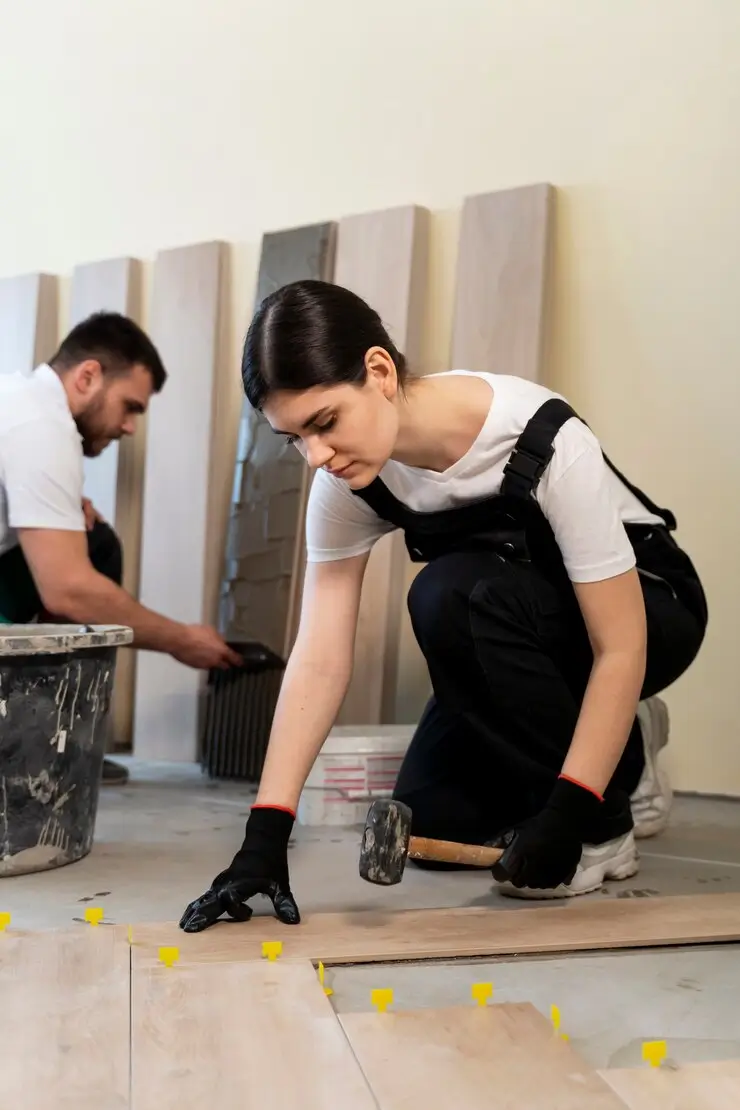Introduction
Selecting the perfect floor and decor tile can transform any space from ordinary to extraordinary. With the tile market worth $567 billion globally by 2025, homeowners and designers alike are faced with more choices than ever before. The floor and decor tile process can be intimidating. Still, this complete guide is here with important information to help you make the best possible choices for aesthetics, durability, and value.
Understanding Floor and Decor Tile Basics
Types of Floor and Decor Tile
“The first step to successful tile selection begins with understanding the characteristics of each material and how they match with your specific needs,” says master tile installer Marcus Rodriguez. Common types include:
- Ceramic Tile
- Porcelain Tile
- Natural Stone
- Glass Tile
- Cement Tile
- Luxury Vinyl Tile (LVT)
Material Characteristics Comparison
| Tile Type | Durability | Cost Range/sq.ft | Maintenance | Water Resistance |
| Ceramic | High | $2-$8 | Easy | Good |
| Porcelain | Very High | $3-$15 | Easy | Excellent |
| Natural Stone | Moderate-High | $5-$30 | Moderate | Varies |
| Glass | Moderate | $7-$30 | Easy | Excellent |
| Cement | High | $14-$30 | High | Good |
| LVT | High | $2-$7 | Easy | Excellent |
Selecting the Right Floor and Decor Tile
Factors to Consider
- Location and Usage
- Traffic patterns
- Moisture exposure
- Indoor vs. outdoor
- Commercial vs. Residential
- Style and Design
- Contemporary vs. traditional
- Colour schemes
- Pattern options
- Texture preferences
- Practical Considerations
- Budget constraints
- Maintenance requirements
- Installation complexity
- Longevity expectations
Popular Floor and Decor Tile Trends
Current market research indicates these trending options:
- Large Format Tiles (48% market share growth)
- Wood-Look Porcelain (35% annual increase)
- Geometric Patterns (27% popularity surge)
- Sustainable Materials (42% consumer preference)
- Mixed Material Designs (31% design specification increase)
Installation Considerations
Professional vs. DIY Installation
Compare installation options:
| Aspect | Professional | DIY |
| Cost | $5-15/sq.ft | $2-5/sq.ft |
| Time | 2-5 days | 5-14 days |
| Quality | Guaranteed | Variable |
| Warranty | Often Included | Limited |
| Tools Required | Provided | Purchase Needed |
Essential Installation Steps
- Surface Preparation
- Remove existing flooring
- Level subfloor
- Clean thoroughly
- Apply primer if needed
- Layout Planning
- Measure space accurately
- Calculate tile needs
- Plan pattern layout
- Account for cuts and waste
- Installation Process
- Apply appropriate adhesive
- Set tiles with proper spacing
- Allow adequate drying time
- Apply grout and seal
Maintenance and Care
Daily Maintenance
Keep floor and decor tile looking new with the following:
- Regular sweeping or vacuuming
- Prompt spill cleanup
- Appropriate cleaning solutions
- Soft cleaning tools
Long-term Care
Protect your investment through:
- Annual deep cleaning
- Periodic sealing (as needed)
- Professional inspection
- Preventive maintenance
Design Applications
Room-Specific Recommendations
- Kitchen Floor and Decor Tile
- Slip-resistant surfaces
- Stain-resistant materials
- Durable options
- Easy-clean designs
- Bathroom Applications
- Water-resistant choices
- Non-slip surfaces
- Decorative accents
- Steam-resistant options
- Living Areas
- Comfortable textures
- Sound-dampening options
- Elegant designs
- Wear-resistant materials
Pattern and Layout Options
Popular design choices include:
- Herringbone
- Subway
- Basketweave
- Chevron
- Moroccan
- Grid
Cost Considerations
Budget Planning
Industry averages for complete tile projects:
| Project Scope | Budget Range | Time Frame |
| Small Bath | $1,000-3,000 | 2-4 days |
| Kitchen | $2,500-5,000 | 3-7 days |
| Large Living Area | $4,000-10,000 | 5-10 days |
Value Analysis
Consider long-term value factors:
- Durability rating
- Maintenance costs
- Resale impact
- Energy efficiency
- Style longevity
Sustainability and Environmental Impact
Eco-Friendly Options
Growing environmental awareness has led to the following:
- Recycled content tiles
- Low-emission manufacturing
- Local sourcing options
- Water-saving production
- Sustainable materials
Energy Efficiency
Thermal properties comparison:
- Ceramic: Moderate heat retention
- Porcelain: Excellent thermal mass
- Natural stone: Superior heat retention
- LVT: Limited thermal benefits
FAQ Section
Q: What is the most durable type of floor and decor tile? A: Porcelain tile typically offers the highest durability, with a water absorption rate of less than 0.5% and excellent resistance to wear, making it ideal for high-traffic areas.
Q: How do I calculate how many tiles I need?
A: Measure the square footage of your space and add 10-15% for cuts and waste. For complex patterns, increase the overage to 15-20%.
Q: What’s the average lifespan of floor and decor tile?
A: With proper installation and maintenance, ceramic and porcelain tiles can last 50+ years, while natural stone can last a lifetime.
Q: How often should tiles be sealed?
A: It depends on the material: porcelain rarely needs sealing, while natural stone, depending on use, may need resealing every 1-5 years.
Conclusion
From material properties to design aesthetics, most floor and decor tile decisions are based on consideration of several factors—sometimes even conflicting ones: Why Floor and Decor Tile and Selecting The Right Type Of Floor and Decor Tile Knowing about these aspects can help you make smart decisions that lead to gorgeous, durable, and valuable enhancements to your space.
Take action with these steps:
- Evaluate your space and needs
- Research material options thoroughly
- Set a realistic budget
- Plan installation logistics
- Establish a maintenance routine
Remember, successful floor and decor tile projects combine thoughtful planning with quality materials and proper installation. Start your journey to beautiful tile spaces today by implementing the knowledge gained from this guide.

